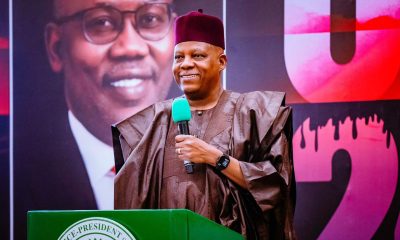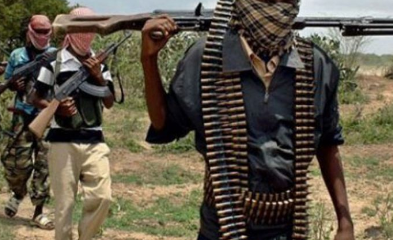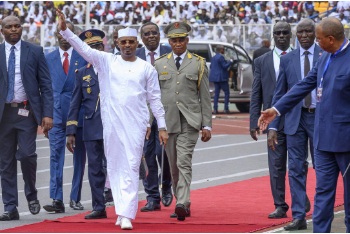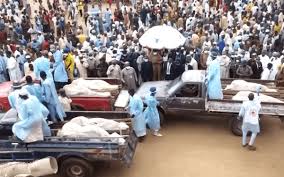· As Echoes of disquieting notes rise over Army’s onslaught of Shi’ite Muslims
By SUNDAY ODIBASHI
President Muhammadu Buhari has sent strong signals to groups in the country either challenging or contending with the powers of the Federal Government in pursuit of subjective parochial interests. The President made the declaration that no group in the country will be allowed to hold the country to ransom. “We must never again allow any group to hold the nation to ransom under whatever guise,” Buhari had declared.
Meanwhile, the Army/Shi’ite Muslims bloody clash in Zaria, Kaduna State, penultimate week, has continued to generate uncompromising sentiments across the world in ways that threaten Nigeria’s national security.
That episode was significant in two distinct world views. The issue of human rights violation no longer has religious or ethnic boundaries. Secondly, religious sects are becoming so powerful to challenge the authorities of the state with confidence and, apparently, becoming a serious threat to nation building.
The Nigerian Army has continued to receive unrestrained bashing from several interest groups in the Saturday December12, 2015 Army/Shi’ite clash. The Federal Government has also received warnings from the international community, particularly, from two countries in Asia – Iran and Iraqi. There have also been symptoms of tension from the Muslim community.
From the domestic environment, several trade unions, including Nigeria Labour Congress (NLC), Non-Governmental Organisations and array of civil society coalitions, have condemned the army for the killing of the protesting Muslims.
Apparently, the Access to Justice, an NGO in Lagos, condemned, in the strongest terms, the attack on Sheikh Ibrahim El ZakZaky and members of the Islamic Movement of Nigeria (Shi’ite Sect) in Zaria on Saturday, December 12, 2015, by the Army accompanying the Chief of Army Staff, Lieutenant General T.Y. Buratai. Several lives were said to be lost. The NGO also condemned the raiding of the residence of Sheikh El ZakZaky the following day, his arrest, loss of more lives and destruction property.
The group decried that the Army has given conflicting accounts of what happened on the day. At first, the Army said the Chief of Army Staff was the target of an assassination plot; in another statement, Army spokesperson, Colonel Usman Sani, said the members of the Sect were blocking the passage of the COAS convoy on the road which necessitated their use of lethal weapons against them, it noted.
Access to Justice expressed dissatisfaction with the explanations and accordingly demanded that a thorough, independent and impartial inquiry be carried out by the Federal Government over the incident. The NGO lamented that this is not the first time the Nigerian Army has attacked members of the sect. It recalled that in July 2014, scores of members of the group, including two sons of Sheik El Zakzaky, were killed by the Army as they were holding a peaceful procession along a road. “Up till this time, the Nigerian Government is yet to investigate the incident neither has anyone been brought to account over the attacks,” it protested.
Access to Justice contended that “the failure of the Nigerian Government to investigate the 2014 killings may have contributed indirectly to the 2015 killings because where governments do not show serious concern for the safety and integrity of human life and allow security or law enforcement agents to act with impunity, this strengthens the hands and minds of abusers. This is why the government needs to draw a line in the sand and begin to take its national and international obligations to protect human rights more resolutely.”
More so, the Socialist Party of Nigeria (SPN) condemned, in strongest terms, the repression of the leadership and members of Shi’ite Islamic Sect in Kaduna State by the Army. “We call for the immediate release of El ZakZaky and other Shiites, who are currently languishing in detention. We also condemn the pronouncements credited to the Kaduna State Governor, Mallam El-Rufai, imposing ban on mass processions and protests in the state, which is directly targeted at the Shiites,” the group said.
The group in a statement by Segun Sango, National Chairperson, expressed: “While we of the SPN may not agree with the Shiites on their religious fundamentalist perspectives and methodology, we submit that they have fundamental right to peaceful assembly. We hold that the argument of Army that the repression of the Shiites was provoked by the barricading of the highway which the Chief of Army Staff was plying as completely baseless,” it declared.
“We hold that the brutal repression of the pro-Biafra uprising and the Shiites’ mass processions by the Nigerian Army is a warning to the working class movement and it signals the looming attacks on democratic rights and efforts to impede mass struggle against anti-worker attacks in the coming period. We call for a democratically constituted panel of inquiry made up of elected representatives of the trade unions, the rank-and-file of the Shiites and other pro-working people’s organisations to probe the attack on the Shiites,”Sango declared. He added: “… the Chief of Army Staff, General Barutai, has shown that the Nigerian Army under his leadership is an anti-democratic and repressive army and we demand his immediate resignation.”
After studying the footage of the events preceding the shootings, Access to Justice observed that: The convoy of the Chief of Army Staff could have, in order not to escalate an already volatile situation that was unraveling along Zaria road, chosen another route into Kaduna. It noted that “this would have been a course of action you would expect from a very senior official of government who wants to avoid possible, in fact, likely repercussions of engaging in a violent confrontation with the protesters.” It was remarked that it was reasonably foreseeable that the violence can further inflame religious passions which were already very high among members of the Islamic Movement who had already lost many members to military attacks last year, and the previous years. Such confrontation could also trigger a violent backlash and radicalize members of the group in the same way that Boko Haram was transformed after security and law enforcement officials attacked their members and extra-judicially executed many of them, it observed.
Access to Justice stated the people have a right to assemble freely, even on public streets. Where protests offend against traffic laws, the protesters should be managed or restrained and if necessary, prosecuted, it emphasized.
Second, the convoy of the Chief of Army Staff could also have requested the Police, who are by law, empowered to control protesters, to come in and disperse the crowds. “It is the duty of the Police to clear the roads of obstructions constituted by protesters, and not the Army, Air Force, Navy or DSS…It is patently wrong to shoot and kill one’s way out of such obstructions as the military has done in this case, the Access to Justice argued.
It further observed that in the worst case scenario, the convoy of the Chief of Army Staff could have even chosen to shoot in the air to scare away the protesters, made up of men, women and children as it is also often done in instances where a need arises to disperse crowds.
Access to Justice declared: “we do not think the Nigerian Army acted with the level of restraint, care and responsibility that the occasion demanded.”
Access to Justice also condemned the subsequent arrest and detention of the leader of the Islamic Movement of Nigeria, Sheikh Ibrahim El Zakzaky, his spouse and other members of the Sect. “These arrests are further provocative, illegal and unconstitutional. The army has no powers to hold civilians in “protective custody” against their will or consent. The Nigerian Army should immediately release those arrested and lift its siege of the premises and houses of the sect,” it declared.
Access to Justice also emphasised that “this is a government that has defined itself by change. The continuing silence of the federal government or more precisely, the executive arm of government, on this matter is sending the wrong message to the military. This is worrisome considering that neither the Federal Government nor the Kaduna State Government has offered any relief or medical assistance to the members of the Sect currently in the hospital.” It also decried that “The Federal Government is also silent over reports that the Nigerian Army are reportedly still besieging the residence of Sheikh Zakzaky and the Centre of the Sect and refusing aid agencies and the Sect from providing medical and food supplies to the wounded trapped in the locations of the incidents.” It advocated that the Buhari administration must break from the legacy of the past if it truly represents change for Nigeria, adding: “This administration must lead the charge for a change in the way military authorities conduct themselves as agencies of the Nigerian State. Killing the people an institution is established to defend and serve characterizes the behaviour of an occupying force, not a democratic military.”
Meanwhile, some other stakeholders argue for the supremacy of the state system. They acknowledged that only the state has the monopoly of coercion and is not in competition with any segment or component unit. They contended that blocking the roads against an authority of the state assigned with security of the country creates high risk on the capacity of the authority to secure the country, including those involved in the protest. These stakeholders, however, disapprove the deliberate use of force against armless civilian population.












 Entertainment5 days ago
Entertainment5 days ago
 Health1 week ago
Health1 week ago
 Health4 days ago
Health4 days ago
 Football1 week ago
Football1 week ago
 Football1 week ago
Football1 week ago
 Crime4 days ago
Crime4 days ago
 Crime1 week ago
Crime1 week ago
 Education6 days ago
Education6 days ago
